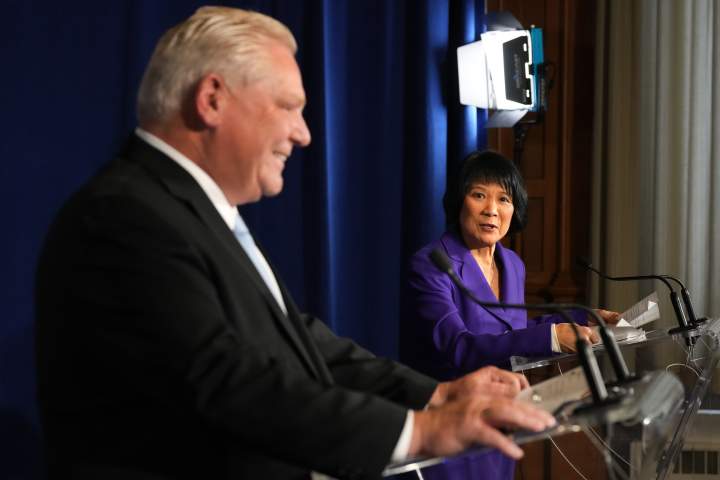Politics
Ontario’s Strong Mayor Powers Criticized for Housing Shortcomings

Municipal civil servants in Ontario have raised significant concerns regarding the effectiveness of the province’s strong mayor system, which was implemented by the government led by Premier Doug Ford in 2022. The law, designed to empower mayors by granting them considerable authority over municipal operations, has been criticized for failing to produce meaningful impacts on housing construction and for blurring political lines.
The strong mayor system allows mayors to appoint the city’s Chief Administrative Officer (CAO), develop the municipal budget, and reorganize local government structures without needing prior approval from city councils. This framework has now been extended to 216 municipalities, with the expectation that it would help mayors overcome obstacles posed by city councilors and accelerate housing and infrastructure development.
Housing Minister Rob Flack defended the initiative, asserting, “By extending strong mayor powers to these additional municipalities, we are providing mayors every tool at our disposal to empower them to get homes and infrastructure built faster.” Despite this assertion, a recent survey conducted by the government relations firm StrategyCorp has highlighted a starkly different reality.
The survey, which compiled anonymous feedback from 32 chief administrative officers, revealed that many civil servants feel the strong mayor powers have not only had little impact on housing development but have also led to increased political tension within councils. One CAO expressed frustration, stating, “We lose. The province loses. They created a solution for a problem that didn’t exist.”
Concerns were raised that the powers are transforming non-partisan civil servants into political players, with one CAO noting that the strong mayor rules now compel them to engage in political games or risk job loss if their recommendations do not align with the mayor’s preferences. Another officer remarked, “I’ve just decided I’m going to be fired at some point,” highlighting the anxiety surrounding job security in this new political landscape.
As the province prepares for municipal elections in 2026, many CAOs worry about the implications of the strong mayor powers on candidate platforms. “Strong mayor powers have caused a new race for mayor,” one CAO pointed out, indicating that some potential candidates explicitly intend to leverage these powers to reshape their municipalities.
Despite the government’s claims that the strong mayor framework has led to positive outcomes, such as prioritizing housing applications in St. Catharines and facilitating over 2,400 new housing units in Ajax, many civil servants remain unconvinced. They argue that the powers have not significantly contributed to meeting the ambitious target of building 1.5 million homes by 2031, set by the Ford government.
Liberal Member of Provincial Parliament Stephen Blais pointed out that many of Ontario’s large municipalities failed to meet the housing targets set by the province in 2024, suggesting that the strong mayor powers have not fulfilled their intended purpose. He noted that these powers have been invoked 637 times by 46 municipalities, with little evidence of faster housing development.
Blais urged the government to pause the implementation of strong mayor powers and conduct a thorough evaluation to determine their effectiveness. “The best mayors in history have achieved the powers associated with the strong mayor legislation by working collaboratively and cooperatively with their councils,” he stated.
Amid these challenges, Sabine Matheson from StrategyCorp emphasized the need for a review of the Strong Mayor, Building Homes Act. She cautioned against extending these powers to additional municipalities while conducting what she termed a “sunset review” of the policy.
As Ontario navigates this complex political landscape, the future of the strong mayor system remains uncertain. The voices of municipal civil servants underscore the pressing need for a reassessment of how these powers are wielded in order to genuinely address the housing crisis facing the province.
-

 Politics4 weeks ago
Politics4 weeks agoSecwepemc First Nation Seeks Aboriginal Title Over Kamloops Area
-

 World5 months ago
World5 months agoScientists Unearth Ancient Antarctic Ice to Unlock Climate Secrets
-

 Entertainment5 months ago
Entertainment5 months agoTrump and McCormick to Announce $70 Billion Energy Investments
-

 Science5 months ago
Science5 months agoFour Astronauts Return to Earth After International Space Station Mission
-

 Lifestyle5 months ago
Lifestyle5 months agoTransLink Launches Food Truck Program to Boost Revenue in Vancouver
-

 Technology3 months ago
Technology3 months agoApple Notes Enhances Functionality with Markdown Support in macOS 26
-

 Lifestyle3 months ago
Lifestyle3 months agoManitoba’s Burger Champion Shines Again Amid Dining Innovations
-

 Top Stories2 months ago
Top Stories2 months agoUrgent Update: Fatal Crash on Highway 99 Claims Life of Pitt Meadows Man
-

 Politics4 months ago
Politics4 months agoUkrainian Tennis Star Elina Svitolina Faces Death Threats Online
-

 Sports5 months ago
Sports5 months agoSearch Underway for Missing Hunter Amid Hokkaido Bear Emergency
-

 Politics5 months ago
Politics5 months agoCarney Engages First Nations Leaders at Development Law Summit
-

 Technology5 months ago
Technology5 months agoFrosthaven Launches Early Access on July 31, 2025



















